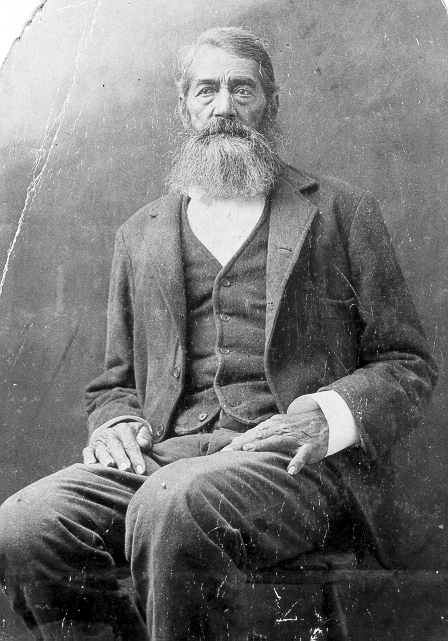CHEROKEE BROWN
San Patricio, Texas, June 14
 After
a short illness, General Jackson Brown, the oldest resident of this place,
died in San Patricio, June 4, 1906. Born in Alabama, December 15, 1818,
his name indicates that the fame of the hero of the Battle of New Orleans
still was the pride of the South and West, “naming the baby” for “Old Hickory”
was the fashion. He grew to manhood and married Sybbie Manuel in his native
state. In 1852, he emigrated, with his father, mother, and brothers to Texas,
where yellow jack* raging, carried all off but the subject of this sketch
and his wife. Finally settling at Refugio, he became well known throughout
this country where he followed the calling of teamster. During the war he
freighted cotton to the Rio Grande, and like many another saw the cargo
of his returning wagon fall into hands of men, presumably honest, who robbed
because there was no law to restrain them, nor determine for their feeble
sense of justice, the great divide between right and wrong.
After
a short illness, General Jackson Brown, the oldest resident of this place,
died in San Patricio, June 4, 1906. Born in Alabama, December 15, 1818,
his name indicates that the fame of the hero of the Battle of New Orleans
still was the pride of the South and West, “naming the baby” for “Old Hickory”
was the fashion. He grew to manhood and married Sybbie Manuel in his native
state. In 1852, he emigrated, with his father, mother, and brothers to Texas,
where yellow jack* raging, carried all off but the subject of this sketch
and his wife. Finally settling at Refugio, he became well known throughout
this country where he followed the calling of teamster. During the war he
freighted cotton to the Rio Grande, and like many another saw the cargo
of his returning wagon fall into hands of men, presumably honest, who robbed
because there was no law to restrain them, nor determine for their feeble
sense of justice, the great divide between right and wrong.
His wife died in 1865, and in 1866, he married Miss Rubena Phillips, the adopted daughter of Col. John Camp. He moved to San Patricio in 1876, was proprietor of the Brown hotel, and erected the first cotton gin in the county, purchasing it second hand from Uncle Johnny Dunn of Corpus Christi. This was for Sea Island cotton only. The people planted it and raised it successfully, realizing from Col. N. Gussett 23 ¼ cents per pound. The gin finally wore out and Sea Island cotton was abandoned for upland cotton.
He was a man of striking appearance, so tall that a casket could not be found in stock of sufficient length for him. His carriage was erect and graceful, his features prominent and his strength, developed by the hardships of frontier life, was Herculean. But this once vigorous man could withstand the ravages of time no longer. The summons came and he went forth. He leaves a widow and nine children, to whom he was ever kind. He was buried from the Catholic church to which in his last years he signified his wish to belong. Father Puig conducted the services.
Transcribed from the Corpus Christi Caller of June 15, 1906
* "Yellow Jack" is an old term used for Yellow Fever. (i.e.
Jacksonville, FL 1888 Yellow Jack epidemic) It was often refered to in the
masculine tense, much like an evil, unseen, heartless killer prowling about
in the dark, seeking out its victims to strike down.
(Patrick King - Executive Director - Blackland Museum, Taft, TX)
Contributed by




